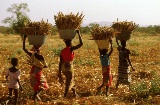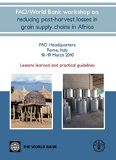Food Loss Related News
Food Loss Related Publications

The High-Level Multi-Stakeholder Consultation on Food Losses and Food Waste in Asia and the Pacific Region | Report
01/01/2014
The Food and Agriculture Organization of the United Nations (FAO) in 2011, launched the Save Food Initiative, which is a global initiative on food loss and waste reduction. Under the banner of this initiative, the FAO Regional Office for Asia and the Pacific (RAP), in December 2012, established collaboration with the Asian Institute of Technology (AIT), Thailand to launch a region-wide Campaign under the banner, “Save Food Asia-Pacific.”

The SAVE FOOD Initiative field studies in Kenya
01/01/2014
During the recent decades numerous studies have been undertaken to assess the quantities of food losses and food waste in many countries of the world. Most of these studies were conducted at national level, and based on literature review, statistical data, and stakeholder interviews.

Reduction of food losses and waste in Europe and Central Asia for improved food secutiry and sgrifood chain efficiency
01/01/2014
This study represents one of a number of UN/FAO-supported research initiatives on the subject of food losses and waste. It builds on the ground breaking research and conclusions of the Global Food Losses Study commissioned in 2011 from the Swedish Institute for Food and Biotechnology, updating its data and consolidating its analysis.

Policy measures for micro, small and medium food processing enterprises in the Asian region
01/01/2014
The importance of micro, small and medium enterprises (SMEs) in contributing to food security and nutrition and to the well-being of Asian economies cannot be overstated. Formal and informal SMEs together account for 60 percent of gross domestic product (GDP) and for more than 90 percent of employment.

Promoting climate smart approaches to post-harvest challenges in Rwanda
01/01/2014
This paper draws lessons from a review of the current status of post-harvest structures in Rwanda and suggests basic design guidelines for greater adaptation to emerging environmental and climate change challenges. This approach is consistent with the strategies Rwanda has adopted to achieve its Vision 2020, the Millennium Development Goals.

Appropriate Seed and Grain Storage Systems for Small-scale Farmers
01/01/2014
The southern Africa region is vulnerable to a diverse array of hazards, largely linked to environmental causes (such as drought, cyclones and floods); human, animal and plant diseases and pests; economic shocks; and in some areas socio-political unrest and insecurity, among others.

Toolkit. Reducing the Food Wastage Footprint
01/01/2013
The aim of the Toolkit is to showcase concrete examples of good practices for food loss and waste reduction, while pointing to information sources, guidelines and pledges favoring food wastage reduction. The inspirational examples featured throughout this Tool kit demonstrate that everyone, from individual households and producers, through governments, to large food industries, can make choices that will ultimately lead to FLW reduction.

Good practice in the design, management and operation of a fresh produce packing-house
01/04/2012
Well designed packing house facilities that conform to the principles of Good Manufacturing Practice (GMP) and which are equipped with an appropriate level and scale of post-harvest technology are critical and important in fresh produce supply chains.

P4P Training Manual for Improving Grain Postharvest Handling and Storage
01/01/2012
The materials in this manual serve as a basic tool for different levels of PHHS trainers working in different contexts and with different end users, with the objective of improving the quality of grain being offered for sale to WFP and other buyers. The manual includes detailed reference materials and...

The role of producer organizations in reducing food loss and waste
01/01/2012
The losses incurred in developing countries are largely due to infrastructural constraints related to poor transport, storage, processing and packaging facilities, in addition to capacity gaps that result in inefficient production, harvesting, processing and transport of food.

Packaging in fresh produce supply chains in Southeast Asia.
01/09/2011
Packaging is very often critical to the success or failure of horticultural supply chains. In recent times, considerable emphasis has been placed on packaging in fresh produce supply chains in order to respond to changing consumer habits, market demand, trade requirements and the drive to reduce losses.

MISSING FOOD: the Case of Postharvest Losses in Sub-Saharan Africa
01/01/2011
Low-income, food-deficit countries have become especially concerned about the global and national food situation over the past three years. While the proximate cause of this heightened concern was the surge in food prices that began in 2006 and peaked in mid-2008, concerns remain for other reasons, among them the higher...
-reduction-rapid-needs-assessment-working-document---malawi-.tmb-th600x450.jpg?Culture=en&sfvrsn=daad216f_3)
Continental Programme on Post-Harvest Losses (PHL) Reduction Rapid Needs Assessment – Working Document - Malawi
01/01/2011
The post-harvest chain involves a series of interconnected activities from the time of crop harvest, live animal sales at farm gate, milk at immediate post-milking stage, or fish capture to the delivery of the food to the consumer. The nature of the activities varies considerably according to the type of...
-reduction.tmb-th600x450.jpg?Culture=en&sfvrsn=6f519668_2)
Continental Programme on Post-harvest Losses (PHL) Reduction Rapid Needs Assessment – Working Document - Ghana
01/01/2011
This note describes the outcomes of a rapid assessment of the post-harvest situation in Ghana for selected commodities (cassava, yams, maize, rice, sorghum, fruits [mangos and pineapples], vegetables [tomatoes], animal products and fish) including key constraints, risks and opportunities, and suggests possible priority interventions and next steps/actions to be taken...

Post-harvest fish loss assessment in small-scale fisheries A guide for the extension officer
01/01/2011
The field activities within the regional post-harvest loss assessment programme in small-scale fisheries in Africa (an FAO regular programme conducted from 2006 to 2008) tested and validated three key fish loss assessment methodologies that have been developed over the past two decades.

Continental Programme on Post-Harvest Losses (PHL) Reduction Rapid Country Needs Assessment - Mozambique
01/01/2011
This note describes the post-harvest situation in Mozambique for selected commodities. It identifies key constraints, risks and opportunities, and suggests possible priority interventions and actions to be taken that may lead to specific projects to be proposed to AfDB and other donors for financing. The annexes provide additional information on...

Processing of fresh-cut tropical fruits and vegetables: A technical guide
01/01/2011
This technical guide reviews, from a theoretical and practical perspective, the critical issues that must be addressed for fresh-cut produce to meet consumer demand for convenience, quality and safety. A case study on fresh-cut processing in Thailand is included.

FAO/World Bank workshop on reducing post-harvest losses in grain supply chains in Africa
01/01/2010
FAO’s Rural Infrastructure and Agro-Industries Division (AGS) and the Agricultural and Rural Development Department (ARD) of the World Bank organised the an internatinal workshop aimed at bringing together experts on the subject of PHL reduction, to discuss the significance of the issue, past experiences, and identify appropriate future interventions.

Management of reusable plastic crates in fresh produce supply chains
31/07/2009
This guide is targeted primarily for use by returnable plastic crate service providers and stakeholders in fresh produce handling chains: producers, packing house operators, and transport and storage operators. Individuals who are involved with capacity building activities in horticultural chains as well as policy makers should also find it a useful reference.

Horticultural Chain Management for Countries of Asia and the Pacific Region
31/01/2009
This training package guides the trainer in preparing the needed resources appropriate to the context in which the training will be delivered. In order to derive maximum benefit from the training package, the trainer must study the theoretical and practical manuals, selecting the practical examples that are best suited to the training context (country, crops cultivated, target audience and so on).
